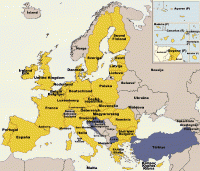Posted in Comment on 11/12/2009 12:49 pm by Stephen Tindale
On 9 November Ed Miliband, the UK Energy and Climate Change Secretary, published National Policy Statements outlining the government policy on energy. These are intended as guidance to the new Infrastructure Planning Commission (IPC), which, from next March, is due to grant or refuse planning permission on major energy and transport infrastructure projects. The statements are good on renewables, nuclear and electricity networks, but less good on coal.
read more »
Posted in Comment on 12/14/2010 05:47 pm by Stephen Tindale
The Cancun climate summit made some progress in three important areas: forests, funding and CCS. None of these was dramatic, but at least the direction was right.
read more »
Posted in Comment on 12/17/2010 02:08 pm by Stephen Tindale
UK Energy Secretary, Chris Huhne, has proposed a radical overhaul of the UK’s electricity market. This is good news, but the government must do more to combat fuel poverty.
read more »
Posted in Comment on 07/17/2009 07:33 pm by Stephen Tindale
On Wednesday 15 July 2009, the UK government published its plan to make the UK a low carbon economy. It is good on electricity, quite good on energy efficiency and heat, but bad on transport.
read more »
- Tags: carbon capture, carbon tax, CCS, CHP, climate change levy, coal power, decarbonisation, energy efficiency, fuel poverty, nuclear power, renewables, statistics, wind power
Posted in Comment on 02/18/2011 09:30 am by Stephen Tindale
There is already substantial debate – much of it heated – about the EU’s Budget from 2014 to 2020, the Multiannual Financial Framework. Money on agriculture should be reduced, while money on rural development and redistribution to poorer regions should be protected or increased. Spending on climate protection should be increased, and all spending should be ‘climate proofed’ to ensure it is not making things even worse.
read more »
Posted in Comment on 11/18/2010 07:25 am by Stephen Tindale
The Cancun climate summit should focus on how to get investment into low-carbon energy, rather than on legally-binding targets (which won’t be agreed anyway). The EU can take a lead here, as former Swedish Finance Minister Allan Larsson is arguing.
read more »
Posted in Comment on 07/02/2009 03:47 pm by Stephen Tindale
Sweden has taken over the six-month presidency of the EU. It was also president when Bush withdrew the US from the Kyoto Protocol and was central in rescuing this treaty. Therefore, the arrival of Swedes is good news for the Copenhagen Conference later this year.
read more »
Posted in Comment, Policy on 06/24/2015 09:03 am by Stephen Tindale
Key quotes from, and a few of my comments on, the excellent Lancet Commission report
read more »
- Tags: 'cap-and-trade', carbon tax, CCS, coal power, decarbonisation, energy efficiency, EU, nuclear power, Public health, renewables, solar power, wind power
Posted in Comment on 06/23/2010 07:13 pm by Stephen Tindale
The UK coalition government has said that it will be the greenest ever UK government. Despite the UK’s high profile on climate on the world stage, that would not actually be very difficult. But yesterday’s Budget was not a good start.
read more »
Posted in Comment on 03/24/2010 09:58 am by Stephen Tindale
Last week, the Norwegian government announced that it is on track to meet its new renewables target for 2011. On the face of it, this isn’t significant. However, Norway is significant on climate change and has played a major role in climate policy for many years.
read more »
Posted in Comment on 06/29/2009 10:18 am by Stephen Tindale
Jeremy Rifkin, president of the Foundation on Economic Trends and adviser to the European Commission and several European governments, says that the Copenhagen Climate Summit in December should focus, not on targets and constraints, but on a climate business plan.
He is right.
read more »
Posted in Comment, Policy on 05/31/2016 08:45 am by Stephen Tindale
Vote Leave is today claiming that, if the UK leaves the EU, domestic energy bills would be lower. They are wrong. Domestic energy bills could and should be reduced by changing taxes and tariffs. It is possible to do this without leaving the EU. Quitting the European Internal Energy Market – the single market for […]
read more »
Posted in Policy on 07/01/2010 05:31 am by Stephen Tindale

The demand to ‘make the polluter pay’ by putting a price on the amount of carbon dioxide and other greenhouse gases produced has been a major point of discussion and debate across Europe since the mid-1980s. This article summarises carbon and energy taxes existing in European countries and how effective they have been.
read more »
Posted in Policy on 04/17/2010 05:44 pm by Stephen Tindale

All three main UK parties take climate seriously and promise to reduce emissions and expand low-carbon energy. They all recognise the energy security and employment benefits. This article includes direct quotations from the relevant parts of the manifestos of the three main parties on general climate policies, covering investment, taxation, land-use planning, adaptation, the EU, the developing world and forests.
read more »
Posted in Repowering communities on 06/21/2010 10:09 am by Stephen Tindale

I am writing a book, with Prashant Vaze and Peter Meyer on the role that local, regional and state governments should play in increasing energy efficiency and promoting low carbon energy. This will be published by Earthscan in 2011.
read more »
Posted in Policy on 04/05/2011 04:32 pm by Stephen Tindale

The EU should spend less money on agriculture and more on improving the econommies of poorer member-states and on climate protection.
read more »
Posted in Policy, Repowering communities on 07/15/2011 09:00 am by Stephen Tindale

This is a summary and analysis of UK’s white paper on Electricity Market Reform and Renewables Roadmap, published this week.
read more »







